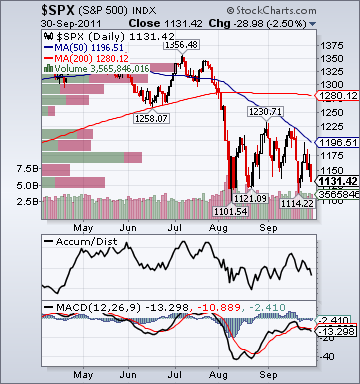Broad Market Tone: - Advance/Decline Line: Higher
- Sector Performance: Mixed
- Volume: Slightly Above Average
- Market Leading Stocks: Substantially Underperforming
Equity Investor Angst: - VIX 38.81 -5.53%
- ISE Sentiment Index 93.0 +75.47%
- Total Put/Call 1.19 -15.60%
- NYSE Arms .83 -82.47%
Credit Investor Angst:- North American Investment Grade CDS Index 139.94 +1.57%
- European Financial Sector CDS Index 247.67 +1.97%
- Western Europe Sovereign Debt CDS Index 340.0 +.09%
- Emerging Market CDS Index 349.86 -.83%
- 2-Year Swap Spread 30.0 unch.
- TED Spread 36.0 unch.
Economic Gauges:- 3-Month T-Bill Yield .01% +1 bp
- Yield Curve 170.0 -5 bps
- China Import Iron Ore Spot $171.50/Metric Tonne -.64%
- Citi US Economic Surprise Index -36.50 +5.5 points
- 10-Year TIPS Spread 1.83 -4 basis points
Overseas Futures: - Nikkei Futures: Indicating +19 open in Japan
- DAX Futures: Indicating +13 open in Germany
Portfolio:
- Slightly Higher: On gains in my Biotech/Medical longs and Emerging Markets shorts
- Disclosed Trades: Added to my (IWM)/(QQQ) hedges, then covered some of them and some of my (EEM) short
- Market Exposure: Moved to 75% Net Long
BOTTOM LINE: Today's overall market action is just mildly bullish, as the S&P 500 gives up some morning gains on rising Eurozone debt angst, rising tech sector pessimism, rising food/energy prices, global growth worries and profit-taking. On the positive side, Bank, I-Bank, Drug, Insurance, Homebuilding, REIT and Road & Rail shares are rising on the day. (XLF) has outperformed throughout the day. Major European stock indices rose 1-2% today. On the negative side, Coal, Alt Energy, Oil Service, Steel, Internet, Computer, Semi, Disk Drive, Networking, Biotech, HMO, Retail, Restaurant, Gaming and Education shares are under significant pressure, falling more than 2.0%.
Growth stocks are substantially underperforming value shares. The tech sectors has also underperformed throughout the day. Lumber is falling -1.3%, the UBS-Bloomberg Ag Spot Index is rising +2.0%, oil is gaining +1.8%, gold is rising +.6% and copper is dropping -.9%. Rice is still close to its multi-year high, rising +27.0% in about 12 weeks. The average US price for a gallon of gas is -.01/gallon today to $3.46/gallon. It is up .32/gallon in about 7 months. The Germany sovereign cds is gaining +1.76% to 105.83 bps, the China sovereign cds is gaining +4.84% to 173.76 bps, the Japan sovereign cds is gaining +2.3% to 144.0 bps and the Brazil sovereign cds is rising +2.24% to 186.34 bps. The Western Europe Sovereign CDS Index and the European Financial Sector CDS Index are still near their records. The 3-Month Euro Basis Swap fell -4.44 bps to -104.67 bps. The Asia-Pacific Sovereign CDS Index is surging another +5.5% today to a new record 166.25 bps. The China sovereign cds is now at the highest level since March 2009. The China Development Bank Corp cds is rising another +2.17% to 340.55 bps, which is also the highest since March 2009. As well, the China Blended Corporate Spread Index, which has been moving higher in a parabolic fashion, is making another new multi-year high, rising +22.0 bps to 840.0 bps. The Shanghai Composite, which continues to trade very poorly, fell another -1.1% overnight, leaving it down -15.78% ytd at the lowest level since July 2010. Various global credit angst gauges continue to trend higher, which remains a large negative. Many growth stock leaders are breaking down on volume today. Globally, market action indicates intensifying fears of recession, however according to a recent poll 79% of money managers don't see a double-dip, which is a negative. The bears inability to capitalize on this afternoon's swoon, likely means more short-term upside into quarter's end. I expect US stocks to trade mixed-to-higher into the close from current levels on quarter-end short-covering/window-dressing, less financial sector pessimism, bargain-hunting and a bounce in the euro currency.
